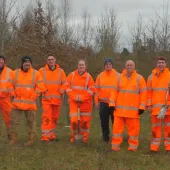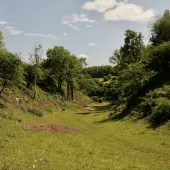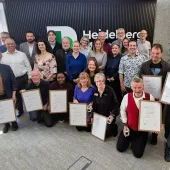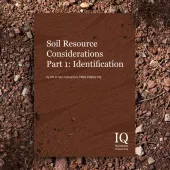Batts Combe Quarry project wins research award

Project team from University of the West of England wins top prize in UK section of Quarry Life Award 2016
A BIODIVERSITY research project carried out at Batts Combe Quarry, in Cheddar, Somerset, has won the top prize in the UK section of HeidelbergCement’s Quarry Life Award 2016.
The project by a team from the University of the West of England (UWE) looked at the importance of grassland restoration of quarry benches for bats. It was awarded a trophy and the £4,500 first prize at a ceremony at Middleton Hall, near Tamworth, in Staffordshire.
The study was led by Dr Mark Steer and concluded that re-vegetated benches can be highly beneficial for bats. A survey carried out by students from UWE found that there were 16 times more bat species flying and feeding in the sheltered areas on quarry benches than on other grassland areas around the site, and made recommendations for the creation and management of new habitats.
HeidelbergCement launched the Quarry Life Award in 2011 to raise the understanding of the biological value of their quarry sites around the world, both during and after extraction. It is run every two years.
Second prize went to Nottingham Trent University for a project carried out at Misson Quarry, in Nottinghamshire, which looked at the importance of bare-ground habitat to invertebrate biodiversity.
Two universities shared third place. Students and researchers from Cranfield University carried out a project at Grange Top Quarry, in Ketton, Rutland, to investigate how a better understanding of soil properties could benefit restoration targets, while Bath Spa University examined the potential for using drones as an alternative way to carry out ecological surveys.
The prizes were presented by Daniel Cooper, chief executive officer of HeidelbergCement’s UK subsidiary, Hanson.
‘This amazing biodiversity competition is incredibly popular with both academics and students in countries across the globe from Ghana and Indonesia to Ukraine and Australia,’ he said.
‘A quarry provides a rich variety of landscapes and habitats which can promote exceptional flora and fauna. The Quarry Life Award offers a unique opportunity to add true ecological and educational value to what for us is our normal working environment.’
More than 450 projects in 21 countries were initially registered back in the spring and around 100 were selected to go forward to the research phase over the summer. The various national winners will now be judged for the international awards, which will be presented in Brussels in December.
Hanson’s senior sustainability manager, Martin Crow, who is UK co-ordinator for the awards, praised the enthusiasm and commitment of the participants and the high quality of the scientific research. ‘All the projects were of an exceptionally high standard and it was very difficult to pick a winner,’ he said.









